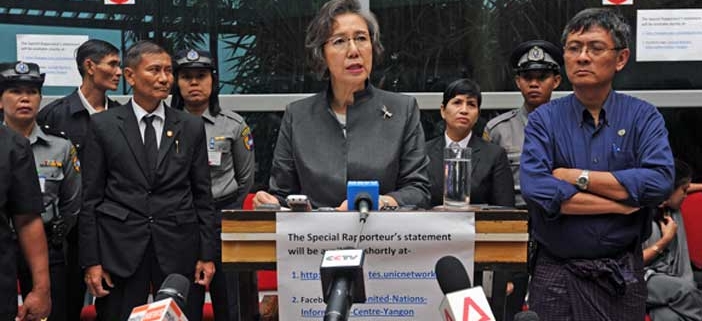UN Envoy Says New Government in Myanmar Faces Many Rights Problems
The same day that Myanmar’s parliament voted in the first president without a military background in more than half a century, the United Nations held an open dialogue on the latest report submitted by its human rights envoy to the country, which noted that the new government faces a slew of problems from ending civil wars to granting basic rights to the Rohingya minority group.
Yanghan Lee, the United Nations special rapporteur on the situation of human rights in Myanmar, also called for the release of political prisoners in Myanmar, during the interactive dialogue held by the U.N. Office of the High Commissioner for Human Rights (OHCHR) on Monday in Geneva, Switzerland, based on her report dated March 8.
Representatives from other countries attended the session along with Myanmar government representatives, human rights activists, religious organizations and women’s organizations.
“Yanghee Lee pointed out several major problems, such as the military’s involvement in the country’s reform process, the military’s control of important ministries, challenges for new government to reform the judicial system, and human rights violations,” said Aung Myo Min, director of Equality Myanmar, a Myanmar-based nongovernmental organization that focuses on human rights education and advocacy programs.
She also noted the use of hate speech in Rakhine state and an increase in the number of internally displaced persons in northern Shan and Kachin states due to ongoing fighting, Aung Myo Min told RFA’s Myanmar Service.
During the dialogue, the United States said it was concerned about continuing military influence over parliament.
Myanmar’s military has considerable influence in the country because it is guaranteed a quarter of the seats in both houses of parliament, giving it an effective veto over proposed constitutional changes. It also controls three key security-related ministries.
Ongoing fighting between the government military and armed ethnic groups in western Myanmar’s Rakhine state as well as in Shan and Kachin states has sent tens of thousands of civilians fleeing their villages for safety amid artillery and bomb attacks as well as rights violations by both sides, including forced labor, torture and sexual violence.
Lee recommended that the government collect data regarding sexual violence and include a definition of rape in national legislation in compliance with the U.N.’s Convention on the Elimination of All Forms of Discrimination against Women.
The report came as Myanmar’s parliament elected as president Htin Kyaw, a long-time aide to Aung San Suu Kyi, chairwoman of the pro-democracy National League for Democracy (NLD) party that won general elections last November by a landslide.
The constitution, drafted in 2008 when a military junta ruled the country, prohibits Aung San Suu Kyi from becoming president because she has foreign-born relatives.
Plight of the Rohingya
Lee also called for an end to discrimination against the mostly Muslim Rohingha ethnic minority group in Rakhine state, Aung Myo Min said.
Concrete action must be taken to address the “structural dimensions” that have prompted human rights concerns in Rakhine, Lee said.
Myanmar’s government views the Rohingyas as illegal immigrants from Bangladesh, even though many have lived in the country for generations.
The government restricts the basic rights of the country’s 1.1 million Rohingyas, denying them citizenship, restricting their movements, and disenfranchising them during the national elections four months ago.
Roughly 140,000 other Rohingyas, who were displaced during communal violence with ethnic Buddhists in 2012, live in squalid camps in Rakhine state, while thousands of others have risked their lives at sea in an effort to flee persecution in the Buddhist-dominated nation.
“To date, Aung San Suu Kyi and senior members of her National League for Democracy have shown no inclination to stand up for them,” HRW’s statement said.
Last September, Lee asked authorities in Rakhine state not to ignore the plight of the Rohingya Muslims during a visit to the state, which was overshadowed by protests by Buddhists angry over what they consider to be U.N. bias in favor of the persecuted group.
Her visit came on the heels of a U.N. resolution passed late last August, calling on the government to grant full citizenship to the minority group, allow it to move about freely, and give it equal access to services, according to reports at the time.
In her current report to the U.N., Lee also requested that the Myanmar government open an OHCHR office in the country, end its military clashes by cooperating with all ethnic groups, and abolish or change unfair laws, such as those that discriminate against Muslims, Aung Myo Min said.
Maung Wai, the ambassador and permanent representative of Myanmar at the U.N. in Geneva, said the information in Lee’s report was incorrect, and slammed her accusations of violence against women in areas where armed ethnic groups have engaged in clashes again the government army, Aung Myo Min said.
Maung Wai also said the report should not address topics related to religion during the current OHCHR session so as to not give precedence or priority to the topic.
Reported by Zarni Tun for RFA’s Myanmar Service. Translated by Khet Mar. Written in English by Roseanne Gerin.



